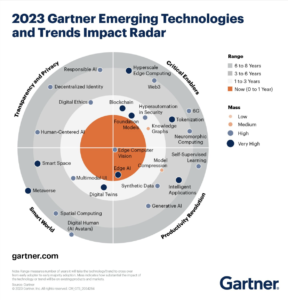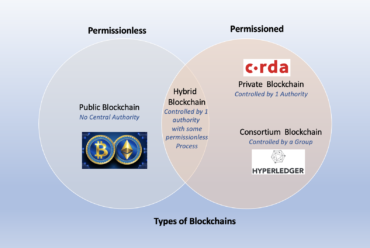“Blockchain Technology: The Future of Secure and Transparent Transactions”
The world has witnessed a technological revolution over the past few decades that has transformed the way we live, work, and interact with each other. Among the latest and most innovative advancements is blockchain technology. It has the potential to revolutionize industries that rely on secure and transparent transactions.
Also, Gartner has highlighted 26 emerging trends and technologies to which vendors must respond, whether they are new or established players in that space. Blockchain and related technologies such as Web3 and Metaverse playing important in upcoming years.
source – 2023 Gartner Emerging Technologies and Trends Impact Radar
In this blog, we will discuss what blockchain is, its benefits over traditional systems, and why it is essential for our digital future.
What is Blockchain?
 In simple terms, blockchain is a decentralized digital ledger that records transactions in a secure and transparent manner. It is a distributed ledger technology (DLT) that allows transactions to be verified and recorded on multiple nodes, eliminating the need for a central authority or intermediary. Block in the chain contains a unique code that is used to identify and verify the transaction, making it immutable and secure. This makes blockchain an ideal solution for industries that require secure and transparent transactions, such as finance, supply chain management, and healthcare.
In simple terms, blockchain is a decentralized digital ledger that records transactions in a secure and transparent manner. It is a distributed ledger technology (DLT) that allows transactions to be verified and recorded on multiple nodes, eliminating the need for a central authority or intermediary. Block in the chain contains a unique code that is used to identify and verify the transaction, making it immutable and secure. This makes blockchain an ideal solution for industries that require secure and transparent transactions, such as finance, supply chain management, and healthcare.
Benefits over Traditional Systems
- Decentralization – Traditional systems rely on central authorities or intermediaries to manage and verify transactions. This can lead to a lack of transparency and accountability, as well as potential security breaches. Blockchain, on the other hand, is a decentralized system that eliminates the need for intermediaries and enables direct peer-to-peer transactions. This makes it more secure and transparent, as each transaction is verified by multiple nodes in the network.
- Security – One of the most significant benefits of blockchain technology is its security. Each transaction is recorded on multiple nodes in the network, making it virtually impossible to hack or alter. This is because any attempt to tamper with a transaction would require altering the entire chain, which is nearly impossible due to the advanced cryptographic algorithms used in blockchain technology. This makes blockchain an ideal solution for industries that require high levels of security, such as finance and healthcare.
- Transparency – Another significant benefit of blockchain technology is its transparency. Since each transaction is recorded on multiple nodes in the network, it is accessible to everyone in the network, providing full transparency and accountability. This is particularly useful for industries that require a high level of transparency, such as supply chain management and logistics.
- Interoperability: Blockchain is designed to work seamlessly with other systems, making it easier to integrate and collaborate with other organizations. This creates new opportunities for innovation and collaboration, driving growth and development.
- Immutability – Immutability provides a high degree of security and integrity to the data stored on the blockchain, making it ideal for applications where data tampering is a concern, such as financial transactions, healthcare records, or supply chain management.
Comparison with Different Systems
- Traditional Systems
As mentioned earlier, traditional systems rely on central authorities or intermediaries to manage and verify transactions. This can lead to a lack of transparency, accountability, and security. In contrast, blockchain technology is decentralized, making it more secure and transparent, with no need for intermediaries. This makes it an ideal solution for industries that require secure and transparent transactions.
- Cloud Computing
Cloud computing is another technology that has gained widespread popularity in recent years. While cloud computing offers a range of benefits, such as scalability and flexibility, it is not as secure as blockchain technology. This is because cloud computing relies on centralized servers, making it vulnerable to cyber-attacks and data breaches.
- Distributed Database
A distributed database is a database that is spread across multiple nodes in a network. While it offers some benefits, such as increased scalability and availability, it is not as secure as blockchain technology. This is because a distributed database relies on a central authority to manage and verify transactions, making it vulnerable to security breaches.
Why do we need Blockchain?
Blockchain technology is essential for our digital future because it offers a range of benefits over traditional systems such as decentralization, security, and transparency. With the increasing reliance on digital transactions, it is essential to have a secure and transparent system. It eliminates the need for intermediaries and provides full accountability. This is particularly important for industries that require high levels of security and transparency, such as finance, healthcare, and supply chain management.
Users can be confident that the data they see on the blockchain is accurate and has not been altered, as immutability enables trust and transparency.
Conclusion
In conclusion, blockchain technology is a game-changer for industries that rely on secure and transparent transactions.Its benefits over traditional systems, including decentralization, transparency, immutability, and security, make it an attractive alternative to traditional systems. As the technology continues to evolve, we can expect to see more applications of blockchain in the future.
Subscribe to our YouTube channel to get regular updates.




